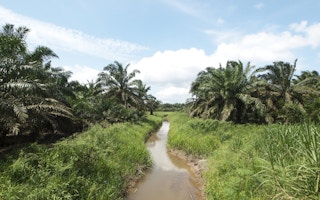Significant erosion of freshwater quality has been added to the list of risks associated with palm oil cultivation, according to a recent study conducted by United States scientists, who focused on small streams close to palm oil plantations and forest areas in West Kalimantan, the Indonesian part of Borneo.
To continue reading, subscribe to Eco‑Business.
There's something for everyone. We offer a range of subscription plans.
- Access our stories and receive our Insights Weekly newsletter with the free EB Member plan.
- Unlock unlimited access to our content and archive with EB Circle.
- Publish your content with EB Premium.
The researchers, who published their findings in the ‘Journal of Geophysical Research: Biogeosciences’, noted that while the rise in carbon emissions due to land clearing for palm oil cultivation has been widely documented, there is a dearth of study on the impact of palm oil plantations on the quality of freshwater sources close to plantations.
“Local communities are deeply concerned about their freshwater sources. Yet the long-term impact of oil palm plantations on freshwater streams has been completely overlooked until now,” said co-author and team leader Lisa M. Curran, a professor of ecological anthropology at Stanford University and a senior fellow at the Stanford Woods Institute for the Environment.
Curran and her colleagues studied the small streams flowing through palm oil plantations and smallholder agriculture in and around the Gunung Palung National Park, a protected forest area in Indonesian Borneo.
“
Our findings suggest that converting logged forests and diverse smallholder agricultural lands to oil palm plantations may be almost as harmful to stream ecosystems as clearing intact forests
Kimberly Carlson, lead author and postdoctoral scholar at the University of Minnesota’s Institute on the Environment
They found that water temperatures in these streams were almost 4 degrees Celsius (more than 7 degrees Fahrenheit) warmer than forest streams, while sediment concentrations were up to 550 times greater. The researchers also noted a high rate of oxygen consumption in these streams - an important measure of a stream’s health during a drought.
This situation, coupled with effects from a massive El Niño-associated drought, could lead to a ‘perfect storm’ and cause the collapse of freshwater ecosystems, warned Curran.
The study cited land clearing, plantation management - which include fertilisers and pesticides application - and processing of oil palm fruits to make crude palm oil as the sources of sediment and other harmful substances that flow into the streams.
The clearing of vegetation along stream banks also has an impact on plant life that organisms in the stream depend on for sustenance and shade, the study added.
The researchers highlighted that the study is one of the first to examine palm oil’s effects on freshwater ecosystems. The sustainability of other water resources, which include marine life such as fisheries, coastal zones and coral reefs — many miles downstream — remains unclear.
Curran and the study’s lead author, Kimberly Carlson, a postdoctoral scholar at the University of Minnesota’s Institute on the Environment, have previously conducted researches on palm oil cultivation in Indonesia.
Their research revealed that from 2000 to 2013, the use of Indonesia’s land for oil palm cultivation more than tripled, with about 35 per cent of Indonesian Borneo’s unprotected lowlands predicted to be cleared for palm oil in the coming years.
“Our findings suggest that converting logged forests and diverse smallholder agricultural lands to oil palm plantations may be almost as harmful to stream ecosystems as clearing intact forests,” emphasised Carlson.
Carlson and Curran, however, offered solutions through improved practices that include maintaining natural vegetative cover next to streams and designing oil palm plantations that do not intersect directly with waterways, as well as those practices pioneered by the Roundtable for Sustainable Palm Oil.
“We hope this work will highlight these issues and bring a voice to rural communities’ concerns that directly affect their livelihoods,” said Curran.

















